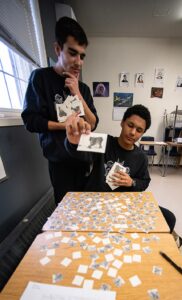Alumni Committee Report
Paul Vrana Alumni Committee Chair – In today’s world, parents and teachers have focused children on the importance of grades or the harder more technical skills as a means of accessing a higher education and presumably a better career.
And while I would agree that there is some merit to this path, I would suggest to you that obtaining and mastering “softer skills” will be just as, if not more important to the future success of a young adolescent.
In more recent years employers have begun to recognize the importance of soft skills and how they affect their competitive advantage. A recent study showed that seven out of ten of the most requested skills in job postings were soft skills and that employers sought out these skills four times more than the top five harder skills.
A second study by the Carnegie Foundation found that 85% of job success comes from soft skills and only 15% from hard skills. So, if hard skills are the formal knowledge (curriculum) you receive in school, what are the soft skills?
Simply put, soft skills are the character traits and inter-personal skills that assist us in interacting with people and organizations and allow us to leverage our hard skills more effectively.
Some of the more common examples of soft skills are leadership, communication, initiative, mentoring, time management, sense of urgency, adaptability, resiliency, and work ethic.
By their very nature these skills are intangible, difficult to learn in the classroom, are critical to the success of people in organizations and yet rarely get the attention in schools that they deserve.
In traditional schools, soft skills were traditionally nurtured in extracurriculars like clubs and sports, however funding trends have diverted resources toward harder rather than softer skills.
The good news is that if you’re reading this you are a student, parent or alumnus of Robert Land Academy, a place where a hundred plus adolescent boys must learn to live and thrive in a communal environment rich in life experiences. Here, acquiring and developing the soft skills so desired in the workplace is a daily experience that is built into the very fabric of the school.
A barracks ready for daily inspection requires initiative and a strong work ethic to get the job done on time and to standard. Coordinating the activities of a house, barracks, or the entire academy requires strong leadership at many levels, initiative, and the ability to adapt so that the team succeeds not just the individual.
And when things don’t work, the boys learn how to deal with failure as it builds character and with some mentoring will make cadets more resilient to the trials and tribulations ahead. All this happens in the first hour of each day with fifteen more hours of the same to go.
As any old boy can attest, only a small fraction of what they learned at the Academy shows up on a report card. The soft skills we learned at the Academy come out in how we carry ourselves, how we approach a problem, how we work, how we treat others, how we thrive as a team, our attitude and how we lead.
I can tell you with certainty if you embrace the culture at the Academy people and employers on the outside will take notice because you will be different from the rest, possessing qualities they are always seeking but rarely find.





